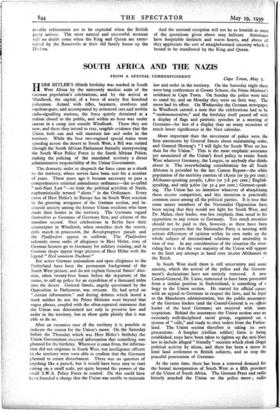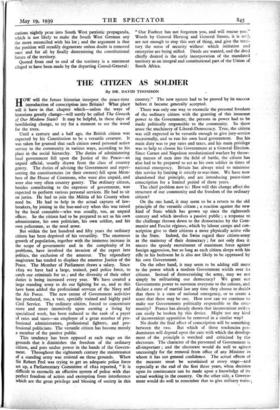SOUTH AFRICA AND THE NAZIS
FROM A SPECIAL CORRESPONDENT
Cape Town, May 5.
HERR HITLER'S fiftieth birthday was marked in South West Africa by the extremely modest scale of the German population's celebrations, and by the arrival at Windhoek, the capital, of a force of nearly five hundred policemen. Armed with rifles, bayonets, revolvers and machine-guns, and accompanied by armoured cars and mobile iadio-signalling stations, the force quietly detrained at a station closed to the public, and within an hour was under canvas in a camp just outside Windhoek. There they are now, and there they intend to stay, tangible evidence that the Union both can and will maintain law and order in the territory. While the four two-engined special trains were speeding across the desert to South West, a Bill was rushed through the South African Parliament formally incorporating the South West Police Force in the South African Police, making the policing of the mandated territory a direct administrative responsibility of the Union Government.
The dramatic order to despatch the force came as a shock to the territory, where nerves have been taut for a number of years. Three years ago it became necessary to pass a comprehensive criminal amendment ordinance—the so-called "anti-Nazi Law "—to limit the political activities of Nazis, euphemistically termed " aliens " in the Ordinance. Every move of Herr Hitler's in Europe has its South West reaction in the growing arrogance of the German section, and in- creased anxiety among the former Union residents who have made their homes in the territory. The Germans regard themselves as Germans of Germany first, and citizens of the mandate second. Nazi celebrations in Berlin have their counterpart in Windhoek, when swastikas deck the streets, girls march in procession, the Berufsgruppen parade and the Pfadfinders appear in uniform. The Pfad finders solemnly swear oaths of allegiance to Herr Hitler, sons of German farmers go to Germany for military training, and in German shops appear huge pictures of Herr Hider with the legend "Heil unserem Fuehrer."
But active German nationalism and open allegiance to the Fatherland have been the permanent background of the South West picture, and do not explain General Smuts' deci- sion, taken twenty-four hours before the departure. of the trains, to call up police for an expedition of a thousand miles into the desert. General Smuts, angrily questioned by the Opposition in Parliament, was reticent. He had acted on "certain information," and during debates which lasted a week neither he nor the Prime Minister went beyond that vague phrase, coupled with the often-repeated statement that the Union was determined not only to preserve law and order in the territory, but to show quite plainly that it was able to do so.
After an extensive tour of the territory it is possible to indicate the reason for the Union's move. On the Saturday before the Thursday which was Herr Hitler's birthday the Union Government received information that something was planned for the birthday. Wherever it came from, the informa- tion did not originate in South West, but intelligence officers in the territory were soon able to confirm that the Germans planned to create disturbances. There was no question of anything like a putsch, but it would have been easy to start ioting on a small scale, yet quite beyond the powers of the S.W.A. Police Force to control. On this could have bn founded a charge that the Union was unable to maintain law and order in the territory. On the Saturday night there were long conferences at Groote Schuur, the Prime Minister's residence in Cape Town. On Sunday the police were told to stand by, and on Monday they were on their way. The move had its effect. On Wednesday the German newspaper in Windhoek carried a note that the celebrations had to be "undemonstrative," and the birthday itself passed off with a display of flags and patriotic speeches at a meeting of Germans—far less of a display than on many occasions of much lesser significance in the Nazi calendar.
More important than the movement of police were the firm statements by General Smuts about maintaining order, and General Hertzog's "I will fight for South West no less than for the Union." This is the most emphatic assurance yet enunciated of the Union's fixed policy to retain South West whatever Germany, the League, or anybody else thinks about it. The overwhelming consideration for all South Africans is provided by the last Census Report—the white population of the territory consists of 18,000 (or 59 per cent.) Afrikaans-speaking people, 1,800 (or 7.8 per cent.) English- speaking, and only 9,600 (or 31.4 per cent.) German-speak- ing. The Union has no intention whatever of abandoning these 20,000 compatriots, and this intention is practically common cause among all the political parties. It is true that some minor members of the Nationalist Opposition have been saying that they would not fight for South West, and Dr. Malan, their leader, was less emphatic than usual in his opposition to any return to Germany. Too much attention should not be paid to this, however, as there have been persistent reports that the Nationalist Party is meeting with serious differences of opinion within its own ranks on the whole subject of international relations and neutrality in time of war. In any consideration of the situation the over- riding fact is that the vast majority of the Union will oppose to the limit any attempt to hand over 20,000 Afrikaners to the Reich.
In South West itself there is still uncertainty and some anxiety, which the arrival of the police and the Govern- ment's declarations have not entirely removed. A new Consul-General, Dr. Lirau, rumoured to 'have been promoted from a similar position in Sudetenland, is something of a bogy to the Union section. He started his official career with an appeal to Germans to respect the laws, and be loyal to the Mandatory administration, but the public assurances of the German leaders (and the Consul-General is ex officio leader of the local Germans) are received with some scepticism. Behind the assurances the Union section sees an extremely well-disciplined racial group, organised on a system of "cells," and ready to obey orders from the Father- land. The Union section therefore is taking its own precautions. A burgher (civilian soldier) force is being established, steps have been taken to tighten up the anti-Nazi law to include alleged " friendly " societies which cloak illegal political activity by aliens, and there has been a move to limit land settlement to British subjects, and so stop the peaceful penetration of Germans.
At the same time, there has been a renewed demand for the formal incorporation of South West as a fifth province of the Union of South Africa. The German Press and radio bitterly attacked the Union on the police move ; radio stations nightly pcur into South West patriotic propaganda, which is not likely to make the South West German any the more reconciled with his lot ; and the argument is that the position will steadily degenerate unless doubt is removed once and for all by finally determining the constitutional future of the territory.
Quoted from end to end of the territory is a statement alleged to have been made by the departing Consul-General: "Our Fuehrer has not forgotten you, and will rescue you." Words by General Hertzog and General Smuts, it is &IL!, are not enough to stop this sort of thing, and give the terri- tory the sense of security without which initiative and enterprise are being stifled. Deeds are wanted, and the deed chiefly desired is the early incorporation of the mandated territory as an integral and constitutional part of the Union of South Africa.



















































 Previous page
Previous page